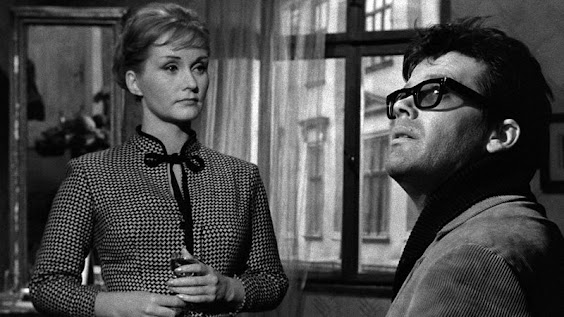 |
| Barbara Krafftowna and Zbigniew Cybulski |
Wojciech Has' How to Be Loved, from 1963 , focuses on a woman's reminisces of an ill-fated wartime romance. Felicja (Barbara Krafftowna) is a successful radio play actress traveling to Paris by air for the first time in 1962. She is anxious about flying, smoking many cigarettes (those were the days) and downing many cognacs. She makes small talk with a Polish emigre, but he is too stiff for her. She thinks back to meeting her great love, Wiktor (Zbigniew Cybulski) on the eve of the Second World War. Wiktor was a star, playing Hamlet to neophyte Felicja's Ophelia. We watch her rehearse for a production that never occurs, interrupted by the invasion of Poland by Germany and Russia. During the occupation, Wiktor is implicated in a killing and a price is put on his head by the Gestapo. Felicja shelters him in a small flat in Krakow for the duration and Wiktor succumbs to her charms, somewhat.
Wiktor comes to resent his confinement and, eventually, Felicja. When the Soviet liberation occurs, he splits as soon as possible with nary a kind word for Felicja. She suffers the indignity of being punished for collaboration, bounces back, but still pines for her Byronic lover. They are reunited, but Wiktor is irredeemable. All of this is intercut with shots of the latter day Felicja onboard the plane. No matter where she is in the course of the fractured narrative, Felicja is beset upon by men with one thing in mind. The more sophisticated suitors, like the emigre on the plane or Tomasz, her manager at a cafe where she has a steady gig, are better able to mask their designs, but they all have the same goal in mind. They are duplicitous swine, to varying degrees, who want to get into Felicja's knickers. War unmasks the rapacious savagery in men which we witness when Felicja is gang raped in her flat.
During this violation, Wiktor cowers in his closet. He is a self-centered child, not worthy of the love the masochistic Felicja offers him. He literally does not play well with others and this dooms his acting career. Even when he plays chess, it is only with himself. The role of Wiktor is a perfect fit for the closest approximation of James Dean Poland ever produced. Cybulski portrays Wiktor as if he is the resistance fighter of Ashes and Diamonds gone to seed after innumerable slugs of vodka and self-pity. His performance is a bit stagey, but this is true to a character with a flair for the self-dramatic. Krafftowna is every bit as effective, but she is playing a character who wallows in masochistic love behind a calm facade. Her performance is more about concealing than revealing. Has and writer Kazmierz Brandy, who wrote the original novel on which the screenplay was based. have crafted a film which shifts point of view, never fully sharing Felicja's suffering. Notice how, in the plane sequences, Has shoots from the POV of the emigre whenever he gazes at a comely stewardess. We are seeing life both from the point of view of the wolves and the lambs.
How to Be Loved is a very good film, but I find its stagey claustrophobia to be emotionally constricted. I also feel the same way about the filmic chamber dramas Ingmar Bergman was crafting at this time. Indeed, Bergman's The Silence would make a well matched and insufferable wartime confinement double feature with How to Be Loved. In both films, the theme of hell being other people wears a little too heavily. Ultimately, the theater was so central to Bergman that a number of his best films (Smiles of a Summer Night, The Magician, After the Rehearsal) could easily have been made for the stage. Has needed to lose his shit and venture into surrealism and the unconscious before delivering a masterpiece with his next film, The Saragossa Manuscript. This film, also featuring Cybulski, is one of the great pictures of the 1960s. Yellow Veil Pictures has released three of Has' fourteen features on disc in the USA: How to Be Loved, The Saragossa Manuscript, and, from 1973, the even more out there, The Hour-Glass Sanitarium. I commend them to all.





No comments:
Post a Comment